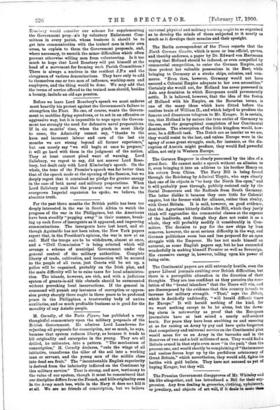The German Emperor is clearly possessed by the idea of
a great fleet. He cannot make a speech without an allusion to it, even bringing it into an address to his brother Henry on his return from China. The Navy Bill is being forced through the Reichstag by Admiral Tirpitz, who says clearly that one of its objects is "to keep the North Sea open," and it will probably pass through, publicly resisted only by the Social Democrats and the Radicals from South Germany. The latter dislike it because they care little for Colonial empire, but the former wish for alliance, rather than rivalry, with Great Britain. It is said, however, on good evidence, that the Agrarians bitterly dislike the Bill, which they justly think will aggrandise the commercial classes at the expense of the landlords, and though they dare not resist it as a whole, they will probably modify it considerably in Com- mittee. The decision to pay for the new ships by loan removes, however, the most serious difficulty in the way, and German politicians seem less and less prepared for an open struggle with the Emperor. He has not made himself an autocrat, as some English papers say, but he has succeeded wonderfully in making himself Premier as well as Sovereign. His excessive energy is, however, telling upon his power of being calm.






































 Previous page
Previous page